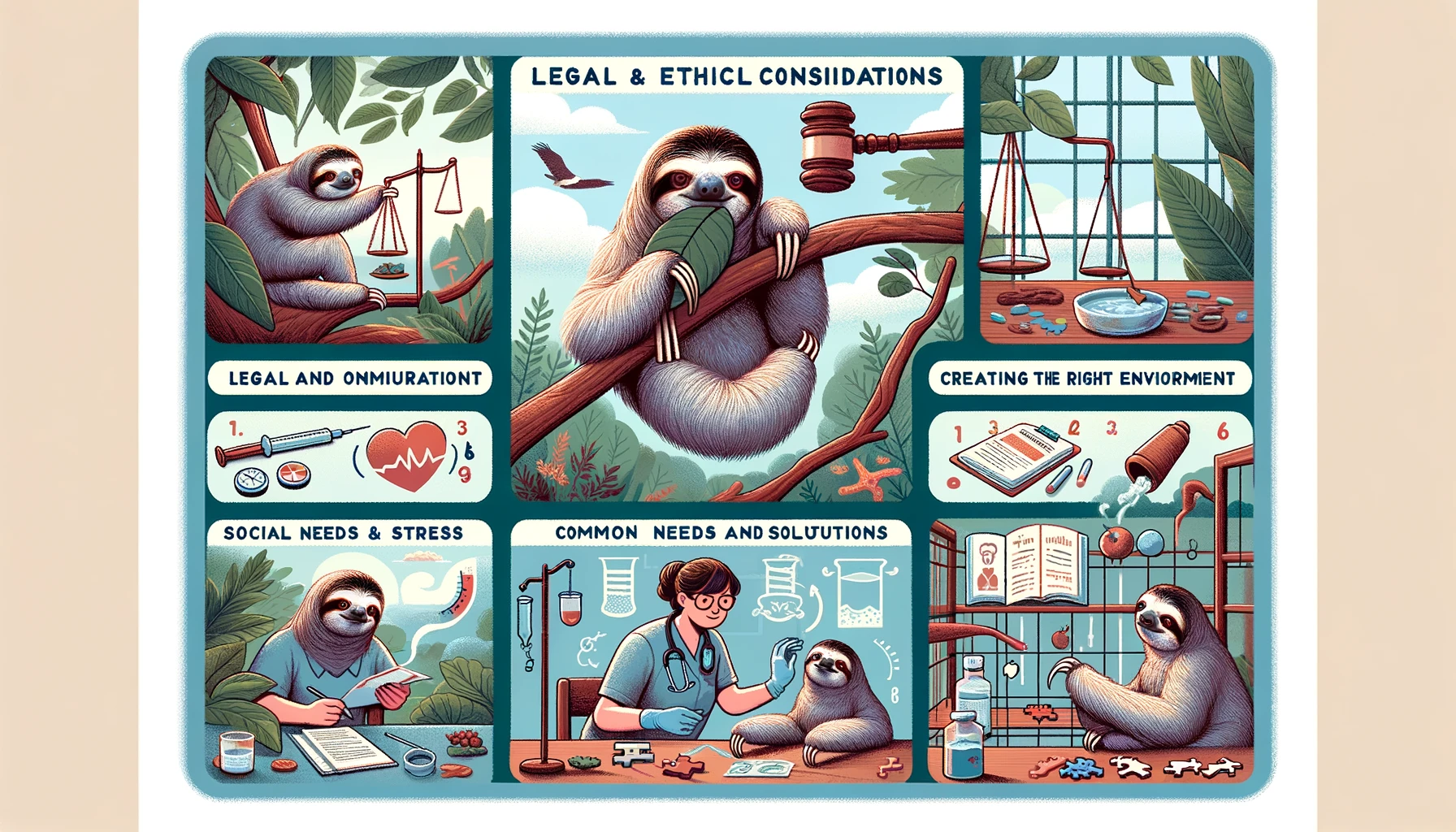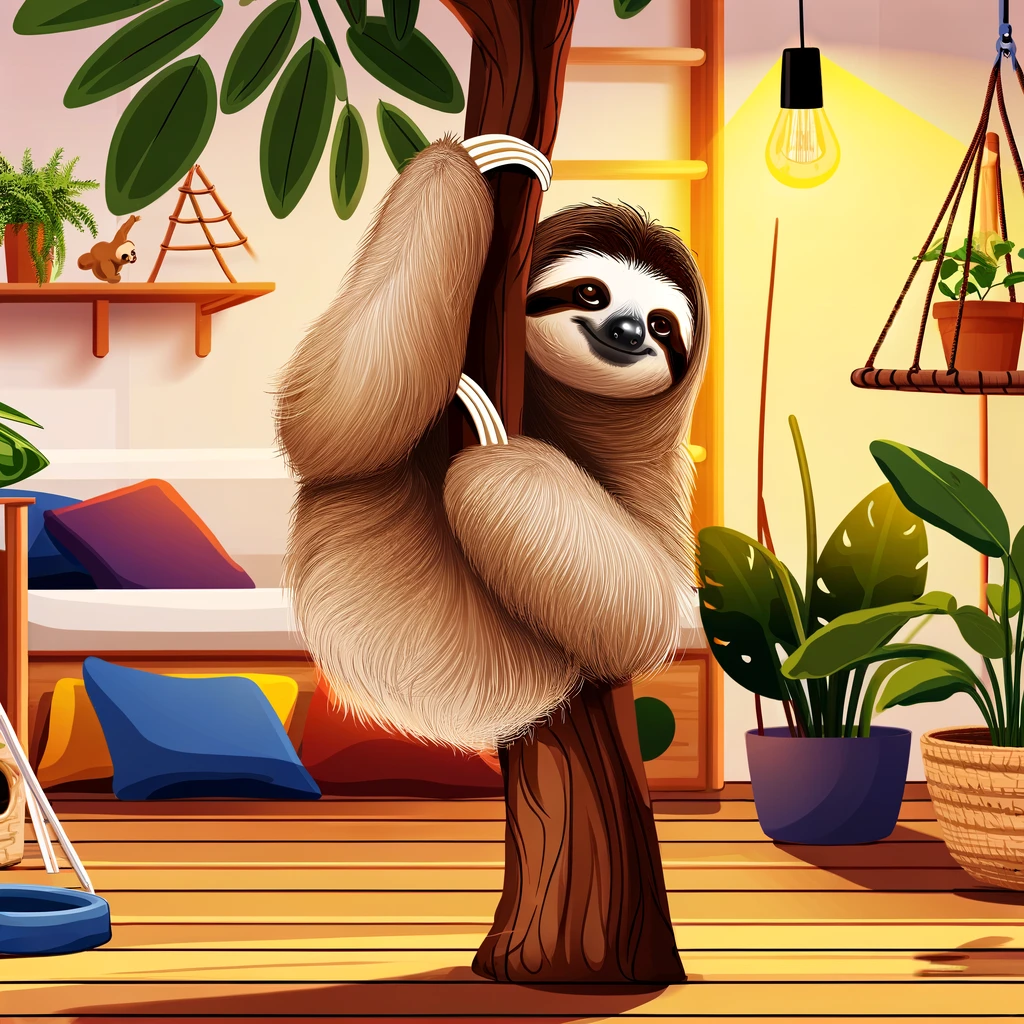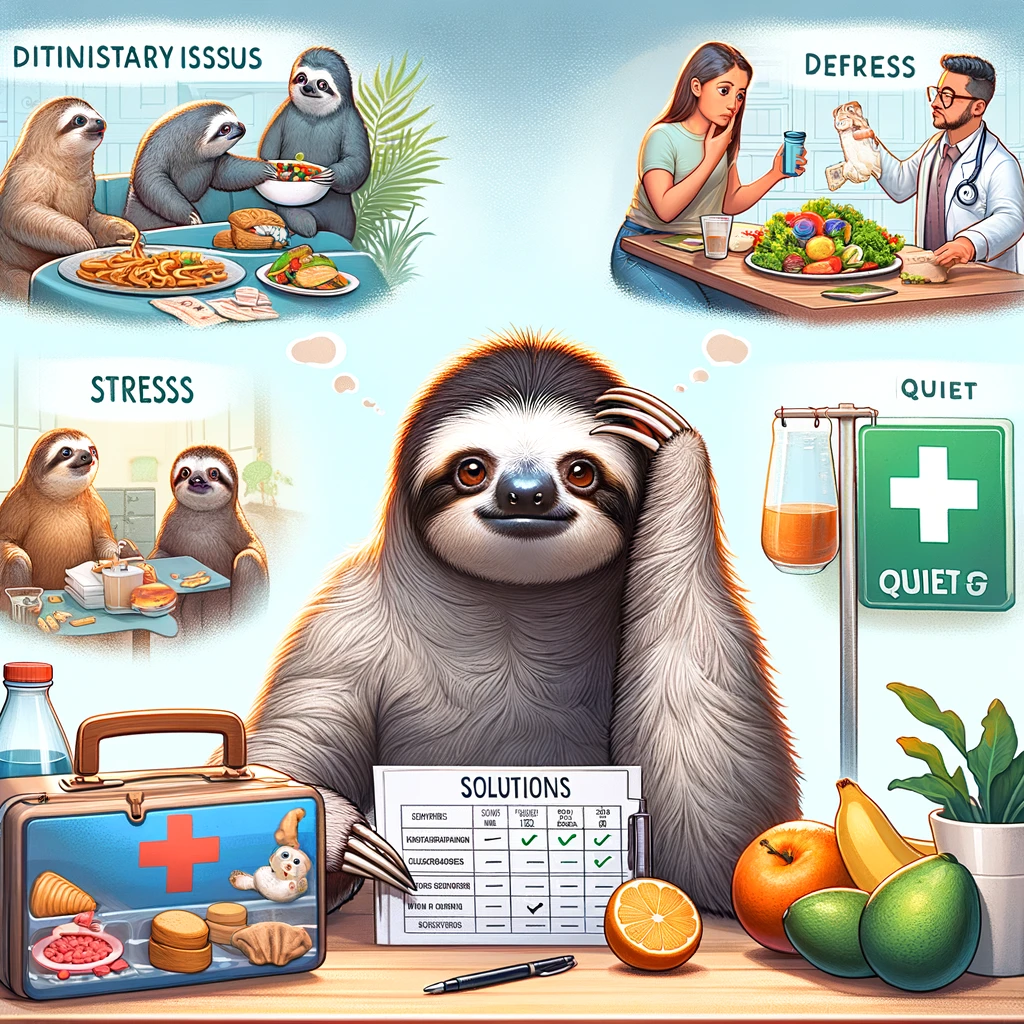Sloths are unique and fascinating animals, known for their slow movements and peaceful demeanor. While they’re not your typical household pet, with the right environment, diet, and care, they can be a rewarding companion. This article provides a comprehensive guide to caring for a sloth as a pet.

Table of Contents
- Introduction to Sloth Care
- Legal and Ethical Considerations
- Creating the Right Environment
- Diet and Nutrition
- Health and Wellness
- Social Needs and Interaction
- Common Challenges and Solutions
- Conclusion
Introduction to Sloth Care
Sloths, native to the rainforests of Central and South America, require a specific habitat and diet to thrive. They are known for spending most of their time hanging from trees and moving very little, which means they have unique care needs compared to other pets.
Legal and Ethical Considerations
Before deciding to keep a sloth as a pet, it’s crucial to understand the legal and ethical implications. Many countries and states have strict regulations or outright bans on keeping exotic animals as pets. Ensure you have the necessary permits and understand the commitment to providing a life-long home for a sloth.
Creating the Right Environment
| Feature | Description |
|---|---|
| Temperature | Maintain a warm and humid environment, around 75-80°F (24-27°C). |
| Enclosure | Large, vertically oriented space with branches for climbing. |
| Humidity | High humidity levels, around 70-80%, are crucial. |
| Lighting | Access to natural light or full-spectrum UV lighting. |

Diet and Nutrition
Sloths have a highly specialized diet. In the wild, they primarily eat leaves, fruits, and flowers. Captive sloths may require a diet supplemented with vitamins and minerals to prevent deficiencies.
Health and Wellness
Routine veterinary care is essential for sloths, including regular check-ups and vaccinations as recommended by an exotic animal vet. Be alert to signs of distress or illness, such as changes in eating habits, lethargy, or unusual behavior.
Social Needs and Interaction
Sloths are solitary by nature but do require interaction and enrichment to stay healthy. This can include varying their environment, providing puzzles or toys, and spending quiet time interacting with them.
Common Challenges and Solutions
| Challenge | Solution |
|---|---|
| Dietary Issues | Consult with a vet to ensure a balanced diet. |
| Stress | Minimize handling and provide a peaceful, stable environment. |
| Health Concerns | Regular veterinary visits and observation for early signs of illness. |

Conclusion
Caring for a sloth as a pet requires a significant commitment to recreate their natural habitat and meet their specific dietary and social needs. It’s a long-term commitment that should not be taken lightly, given their potential lifespan of 20 to 30 years in captivity. Before making the decision to bring a sloth into your home, thoroughly research and consider the dedication required to ensure the health and happiness of your sloth pet.
FAQs
Can sloths be kept as pets legally?
The legality of keeping sloths as pets varies by location. Many countries and states have strict regulations or bans on owning exotic animals. Always check local wildlife conservation laws and acquire the necessary permits before considering a sloth as a pet.
What do sloths eat?
Sloths in captivity typically eat a diet of leaves, fruits, vegetables, and sometimes flowers. Their diet must be carefully balanced and may need to be supplemented with vitamins and minerals to prevent nutritional deficiencies.
How much space does a sloth need?
Sloths need a large, vertically oriented space that mimics their natural habitat. The enclosure should include multiple branches for climbing and resting, and enough room for the sloth to move freely. High ceilings and access to outdoor space (weather permitting) are ideal.
Are sloths easy to care for?
Sloths are considered high-maintenance pets due to their specific dietary, environmental, and social needs. They require a specialized diet, a carefully controlled environment, and regular veterinary care, which can be challenging for the average pet owner.
How do you handle a sloth safely?
When handling a sloth, it’s important to support their body fully, including their legs and back. They should be handled gently and minimally to reduce stress. Always wash your hands before and after handling your sloth to prevent the transmission of diseases.
Can sloths bond with humans?
Sloths can become accustomed to their human caregivers, recognizing them and feeling comfortable in their presence. However, they are not domesticated animals and may not form bonds in the same way dogs or cats do.
How long do sloths live as pets?
With proper care, sloths can live for 20 to 30 years in captivity. This long lifespan means owning a sloth is a significant long-term commitment.
What are common health problems in pet sloths?
Common health issues in sloths include nutritional deficiencies, respiratory infections, and parasites. Regular veterinary check-ups and a carefully managed diet can help prevent these problems.
Do sloths need to be bathed?
Sloths do not typically need to be bathed. In their natural habitat, they bathe by hanging in the rain. In captivity, maintaining proper humidity and a clean enclosure is usually sufficient to keep them clean.
Can sloths be potty trained?
Sloths have a slow metabolism and typically only defecate once a week. While they can be encouraged to use a specific spot in their enclosure, true “potty training” may not be achievable in the same way it is with other pets.
Owning a sloth as a pet requires a deep commitment and a thorough understanding of their needs. It’s essential to consider whether you can provide the appropriate care over the long term before deciding to bring a sloth into your home.

Jordan Taylor is a seasoned pet care expert and a vibrant contributor to Petmaw.com. With over a decade of experience in veterinary science, Jordan brings a wealth of knowledge and a deep passion for animals to every article. After earning a degree in Veterinary Medicine from the University of Alaska Anchorage, Jordan spent several years working in a busy veterinary clinic, where they honed their skills in pet nutrition, behavior, and wellness.
Jordan’s love for animals isn’t just professional; it’s a fundamental part of their life. Home is shared with three rescue Sloth, two cats, and a small flock of backyard chickens, each with their own rescue story and special place in Jordan’s heart. This personal connection to animals shines through in Jordan’s writing, making their advice not only expert but also empathetic and practical for pet owners.
At Petmaw.com, Jordan is dedicated to providing pet owners with the latest research, trends, and tips in pet care, from innovative feeding strategies to understanding the subtle signs of pet health issues. Whether you’re a seasoned pet owner or new to the pet parenting world, Jordan’s insights aim to enhance the well-being of pets and deepen the human-animal bond.
In their spare time, Jordan is an avid hiker, often found exploring the trails with their dogs. They also volunteer at local animal shelters, offering their expertise and helping animals in need find forever homes. Jordan’s commitment to animal welfare and passion for sharing knowledge makes them a cherished member of the Petmaw.com family and a trusted guide for our readers.





